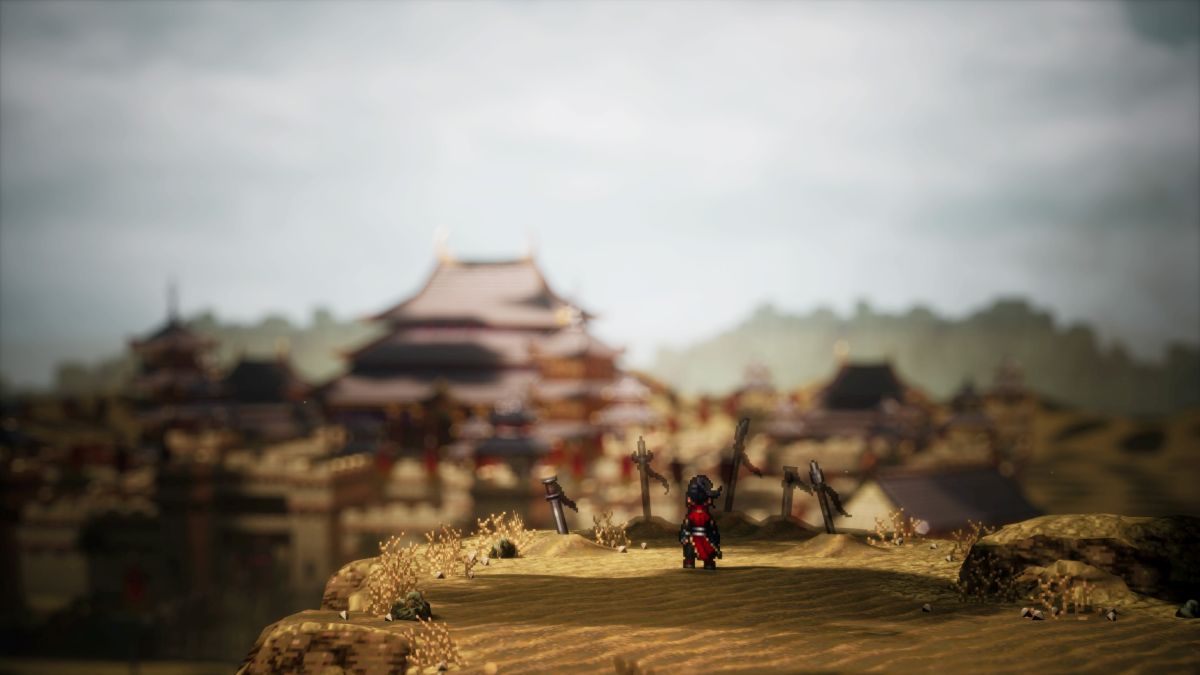Oh, the places you’ll go
With Octopath Traveler 2, Square Enix goes back to the formula of the first. Eight adventurers, each with their own small-scale RPG quests, link up for one overarching journey. Each one will have their own paths to walk, secrets to uncover, and nemeses to vanquish in a heroic fashion. And then, after everyone’s had their origin story, a final chapter will bring it all together, forming the party that will tackle the greatest threat lurking just behind the curtain.
The road ahead was already laid out by its predecessor. But sometimes, it’s as much about the journey as the destination. And where Octopath Traveler 2 doesn’t just succeed but makes a mark is in how it takes you there while making the long journey feel worthwhile.
Octopath Traveler 2 (PS5[reviewed], PS4, PC, Switch)
Developer: Square Enix, Acquire Corp.
Publisher: Square Enix
Released: February 24, 2023
MSRP: $59.99
When I wrote our review-in-progress a few weeks back, I was already much more invested in Octopath Traveler 2 than its predecessor. At roughly the halfway point of the story, I felt Acquire and Square Enix had found a spark in this set-up that didn’t ever ignite for me in the first game. Its world felt more vibrant and alive, offering permutations and evolutions of its locales through the day-night cycle. Cryptic side-quests were more enticing because they allowed for clever Path Action solutions, and these Path Actions felt engaging to use.
Well, sitting at a triple-digits’ worth of hours invested and credits rolled, I still dig Octopath Traveler 2. It’s not often an RPG coaxes this many hours out of me and manages to stay in my good graces. But that’s the magic at work here in the latest HD-2D adventure.
The path less traveled
Let’s pull the lens back to hour one, though. Octopath Traveler 2 has you select one of eight party members from the beginning. Every one of them will eventually be a piece of your party, at least if you want to see the end. For now, though, you focus on one. This one character becomes your focal point; you actually can’t take them out of your party until you finish their entire storyline.
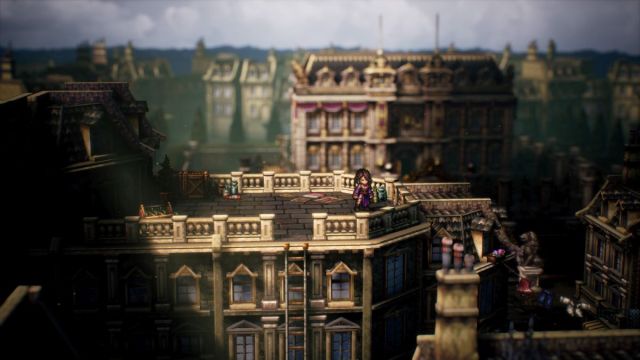
In my case, this was Throne, the thief and assassin who decided she’d had enough of this life and wanted out. She would remove the literal collar around her neck, and kill anyone, even the patriarch and matriarch of her clandestine organization, just to never be forced to spill blood again. It’s a good story, with lots of development for Throne as she explores what her life has meant so far and what freedom even means to someone who’s been told what to do for so long.
I could have gone to Ku instead and started with Hikari’s tale of a usurping brother. Or Temenos’ investigation into the murder of a church official, or Castti’s search for her forgotten origin. Heck, even Partitio, this game’s Merchant who determines that poverty is bad and all should share in prosperity rather than allow a select few to hoard it. Partitio rules.
My point is that every character is good in their own right, and none of them ever bored me or had story segments drag on. After selecting the starting character, I started to journey around the world, recruiting the rest and playing through their chapters; everyone’s Chapter 1, then back through Chapter 2, so-on-and-so-forth. While I was certainly eager to see the conclusion of some over others, I was never loathed to boot up a new installment. It helps that Octopath Traveler 2‘s chapter variety is fantastic. Some characters have individual chapters broken up, spread across locations and even continents. At least one didn’t even have any boss to fight, just conversations and Path Actions.

Travelers interlinked
A big point was made to interlink the stories of Octopath Traveler 2‘s protagonists more than the first did. And to be fair, that has happened here. While the individual story chapters and cutscenes will still primarily focus on that character and any accompanying side characters, there are a few ways the Octo-pals connect more than they did in the predecessor.
Crossed Paths are a new set of stories required for the endgame, which sees the travelers going out in pairs on their own side journeys. They’re just quick pairings, and the chapters aren’t nearly as in-depth as the main story ones. But they do offer some fun interactions, like Castti bonding with Ochette over their work to protect life or Partitio and Osvald becoming unlikely bros.
Travel banter will also pop up now and then, offering a little side chat similar to the skits seen in the Tales Of series. It might disappoint some that we don’t constantly see this crew interacting, but I found it worked. A few scenes would make any character just jumping in to say something a bit odd, and more party banter feels like it would have left less space for the excellent supporting cast of Octopath Traveler 2. These skits also act as fun asides. One might be taking the lead, while the others provide support, and the rest are off hanging out at the tavern or maybe doing their own thing.
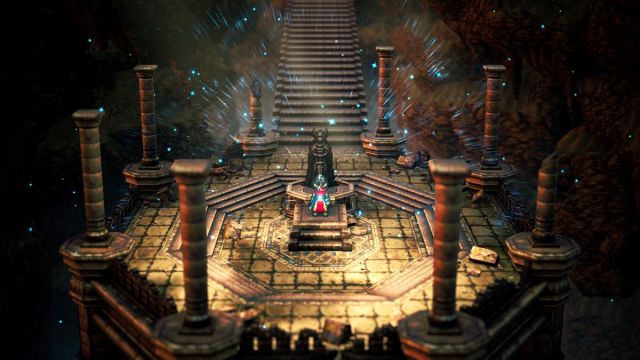
I know that’s a theater-of-the-mind approach, but Octopath Traveler 2 encourages an approach that feels very open. It wants you to explore and discover in this RPG sandbox it’s made. That’s felt most in its side stories, where even small chance encounters like a strange scholar or some weird vibes in a shop can lead to big surprises.
Break it down now
All the words and stories do eventually turn to combat, though. Much like the narrative framing, combat is very similar in Octopath Traveler 2. Turn-by-turn action pits your party against enemies, with a timeline at the top informing you what’s coming up and when. It’s a basic but fluid system. Sometimes, I’d speed through combat, smashing A to smack down some low-level scrubs. But in a boss fight, I’d carefully count out turns, doing head-math on how many attacks and skills I’d need to use, in what order, and with how many Boost Points plus SP costs to avoid a massive attack looming at turn’s end.
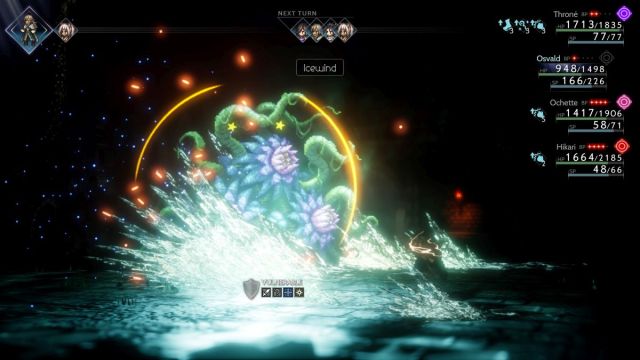
The Break and Boost elements are a core piece of Octopath 2‘s combat friction. Hit an enemy’s designated vulnerabilities to knock off shield points, reduce them to 0 to Break them, then lay on the hurt. Simple enough, right? But it’s getting there, and how you do it, that becomes complex and compelling. If Castti isn’t holding a Sword, for example, she might not be able to hack off a point of shield this turn. But maybe I can reach into my item bag and toss a one-time-use Soulstone for some Fire damage instead. Boosting increases the intensity of magic and some abilities but adds extra strikes if I just use Attack. Using Boost right away for a Break, versus saving it but giving the enemy extra turns, is a constant push-and-pull.
Abilities and equipment offer a lot of ways to customize and optimize, letting fighters specialize deeper into their roles, and then picking up subclasses to learn from others. Support Skills let you pick up anything from an extra Boost Point to a free revive. Octopath Traveler 2 kept me customizing and refining my team throughout the story, and with each character having their own chapters, I was not-so-subtly encouraged to keep swapping around and testing out different interactions and strategies.
The world comes alive
Of course, the HD-2D art looks fantastic. Team Asano’s style has become a bit of a measuring stick for pixel RPGs, but Octopath Traveler 2 still manages to surprise me with new vistas or gorgeous effects. Solistia, the game’s setting, is beautifully laid out too, with everything from deep woods and windy deserts to frigid cliffs. Just as resplendent are the cities and villages that dot the world.

The new day-night cycle lets you manually swap times, and NPCs will change locations and activities based on what time of day it is. Additionally, certain events will only play out if you let the day linger long enough to reach sunset, or the night into dawn. These link into Path Actions, the special abilities that you let get items or information, or even lead NPCs to other places. Or they just inform you a little more of the world. I’ve solved at least two puzzles by just waiting to see if an NPC would move. Octopath Traveler 2‘s time is malleable, but there’s a solid-enough illusion that it doesn’t move only at your whim.
I have to mention the soundtrack too. I loved the Octopath Traveler soundtrack, and the work on Octopath Traveler 2 is just as fantastic. While the soaring theme and other melodies are still here, some new additions really amp up big moments. “Partitio’s Theme” is, specifically, a banger.
The never-ending story
Every aspect of Octopath Traveler 2 just clicks into place with one another, always giving me a reason to journey somewhere new. In the first game, I just main-lined through the story beats. In Octopath Traveler 2, I’d talk to NPCs in new towns just to see if there was something interesting to find, and importantly, that interest was often rewarded.
If there’s any hang-up, it’s the sheer breadth of Octopath Traveler 2. There is, frankly, a lot of game here. The main story alone will likely take you close to 80 hours to see through, and additional side content will just keep stacking up. I never felt it too necessary to grind, though there were a couple of times I’d set out just to bolster an under-utilized party member.
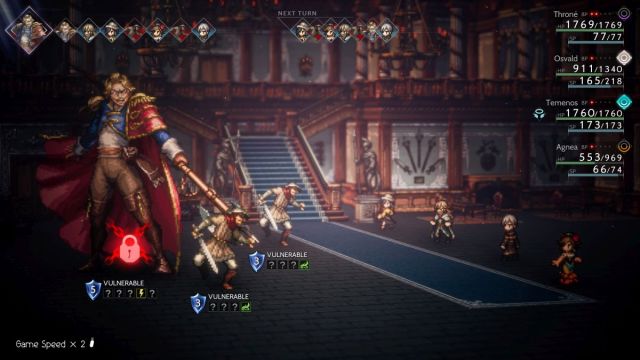
It’s a long journey, and a worthwhile one, but I also get that for some, the amount of hours is a big hurdle. There were a few times around the Chapter 2 to 3 area that I felt the forward momentum lose steam, too. And a lot of the game’s best options, like the ability to read travel banter you might have missed in past Chapters, are a little too tucked away.
Going home
Still, all that said, Octopath Traveler 2 has eaten up my life for the better part of a month, and I’ve still loved it. It’s a full realization of everything that made the original Octopath Traveler good, but built out and expanded upon so much that it feels like a new structure.
I’m still eager to jump back into it, even after seeing the credits roll. There are lingering questions I still have, and little tidbits I want to investigate. There’s an NPC I only discovered late in the game, a swordsman in training, who you can Challenge using Hikari’s Path Action. Every time I’ve come back, he’s a little bit stronger thanks to our last fight. I’m literally training this guy up so I can, hopefully, uncover some secret or hidden move for Hikari to unleash on the remaining secret bosses I want to tackle.
Octopath Traveler 2 isn’t just a great end destination, but a fulfilling journey too. It has a lively world, intricate and engaging combat, fluid progression and builds that reward tinkering, an incredible score, and excellent arcs for all of its protagonists. It somehow has everything I’d want out of an RPG inspired by the old days, but moving forward into new ones too. It took me a long time to get here, but Octopath Traveler 2 is a road worth traveling.
[This review is based on a retail build of the game provided by the publisher.]
